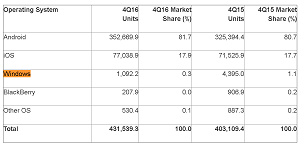News
With 0.3 Percent Market Share, What's Next for Windows Mobile?
- By David Ramel
- February 16, 2017

Windows Mobile garnered just 0.3 percent of the smartphone market share in the fourth quarter of 2016, research firm Gartner Inc. announced yesterday, leaving developers and others wondering just what was going to happen to the OS.
Windows Mobile market share, computed by measuring worldwide smartphone sales to end users segregated by the underlying OS, was pegged at 2.7 percent in Q3 2010 (when Microsoft's mobile OS was called Windows Phone) by Gartner, and fell to 1.5 percent a year later.
For a while, it seemed the Windows Phone/Mobile downward spiral was abating somewhat, judging from research from various sources, but after clocking in at 1.1 percent in Q4 2105, the latest numbers show it's almost at rock bottom. The only platforms below it were BlackBerry (0 percent) and "other" (0.1 percent).
With many lauding Microsoft's technical prowess in the mobile space, that downward spiral was attributed to a vicious cycle wherein lack of interest by users and developers reinforces the downward trend of both camps.
As we reported two years ago, VisionMobile called this phenomenon the "app-gap""
It's kind of a catch-22 situation caused by the lack on inventory on the Windows store compared to the "big two" of Android and iOS. Users are turned off by the poorer selection. Less marketing potential turns off developers, so fewer new apps are created, which further turns off consumers, and so on.
"Unfortunately, lack of scale means that the top new apps come to the Windows Phone platform quite slowly, if at all, and many others are not updated," VisionMobile said at the time. "This leads to the vicious cycle of self-selection, also known as the app-gap -- most users who care about apps don't adopt Windows Phone and so in turn the platform isn't as interesting to the top developers."
 [Click on image for larger view.]
Worldwide Smartphone Sales to End Users by Operating System in 4Q16 (Thousands of Units) (source: Gartner)
[Click on image for larger view.]
Worldwide Smartphone Sales to End Users by Operating System in 4Q16 (Thousands of Units) (source: Gartner)
In the latest Gartner report, Android was credited with 81.7 percent market share, and iOS with 17.9 percent. Windows was in a distant third place.
While many mobile developers are probably wondering if they should devote any resources toward the Microsoft mobile platform, Microsoft has been fairly close-mouthed on the subject. Some media reports, however, indicate the company isn't giving up on Windows Mobile entirely.
"Microsoft: Windows 10 Mobile builds will keep coming 'beyond release of the Creators Update,'" is the headline of an article on the Neowin site yesterday.
The article quoted a presentation by Microsoft's Bill Karagounis at an event in which he was asked about the direction of mobile components of the company's Insider Program. According to the article, he replied:
We've been flighting Mobile builds now for-- actually, since the November Update in 2015. We do not plan to change that, or to stop that.
And you'll see -- today, we are still flighting Mobile builds, subject to quality, subject to those release promotion criteria, and we fully expect to keep doing that beyond the release of the Creators Update."
The Windows 10 Creators Update is expected to land this spring.
Neowin also recently quoted another Microsoft exec, Dona Sarkar, on the subject:
"The future of Windows 10 Mobile is that we're continuing to invest in Mobile," she said. "We're definitely going towards more 'let's help you be as productive as possible with this device in your pocket that you have all the time on you'. We roll builds every week [to internal or external rings], we push features, we do the thing; it's a thing that we continue to invest in, just like all device families."
However, there hasn't been much Windows 10 Mobile blog action lately, with the latest post seeming published last November, though Windows 10 Insider Preview Builds for PC and mobile were announced through last month.
So, while there's no definitive word on the future of Windows Mobile, the company seems to be putting on a brave face.
Meanwhile, several developers weren't too optimistic on the future of Windows Mobile when they commented on a post earlier this month that asked "Is Windows 10 Mobile dead?"
"As a very happy Windows 10 Mobile user presently ... yes, it is unfortunately kind of dead," read one comment, while another said, "I don't think Windows 10 on mobile is dead, but it definitely seems dormant/sleeping right now."
For the moment, the common industry wisdom that iOS development pays off the best because of Apple's higher-end clientele, while Android has the broader reach, seems to be holding true.
As Gartner said yesterday, "In the smartphone operating system (OS) market, Google's Android extended its lead by capturing 82 percent of the total market in the fourth quarter of 2016. In 2016 overall, Android also grew its market share by 3.2 percentage points to reach an 84.8 percent share, and was the only OS to grow market share year on year."
About the Author
David Ramel is an editor and writer at Converge 360.